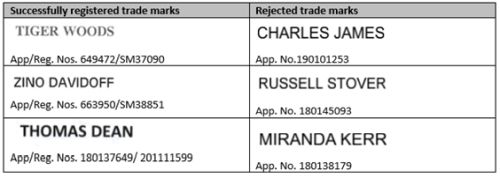Brand owners, celebrities, designers and other well-known figures, usually prefer to use their names as their trade mark. This helps the public easily recognise and differentiate their products from competitors. As easy as it sounds to register your name as a trade mark, registering such marks in Thailand may not be that straight forward.
As the Trademark Act does not provide a clear explanation for the registrability of these types of "name" trade marks, opinions are divided whether names and surnames in plain text are inherently distinctive. Currently the Trademark Office accepts some and has rejected others for registrations. Below are examples of the current inconsistencies.

There are also inconsistencies at the Supreme Court level. In 2017, the Supreme Court ruled that the mark "VALENTINO" (a person's name appeared in plain letters) was inherently distinctive and registrable (Supreme Court No.6616/2560). A year later, the Supreme Court went against this precedent and ruled that the mark "JENNIFER ANISTON" lacked distinctiveness because it was not represented in any stylised format (Supreme Court No. 3499/2561).
Given the inconsistencies at all levels, success is more likely when registering your name in a stylised form. Several stylised names have been successfully registered as trade marks in Thailand:

However, if you have used your name in plain text, we recommend carefully documenting use of the mark. If your trade mark is rejected on the grounds of being non-distinctive, this evidence can be used to prove that your mark has acquired distinctiveness and should be registrable. The more evidence that can be submitted, the more chance of successful registration. Planned updates to the Examination Manual used by examiners in Thailand are likely to suggest two years as the minimum period of use to demonstrate acquired distinctiveness.
The content of this article is intended to provide a general guide to the subject matter. Specialist advice should be sought about your specific circumstances.


